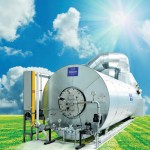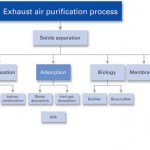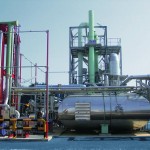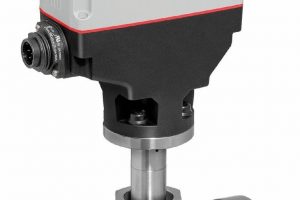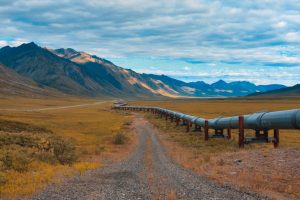High quality and process reliability have always been important requirements for exhaust air purification. To offer the equipment at competitive prices, a global approach with a higher local content is absolutely essential. Over the years, Dürr Environmental and Energy Systems (EES) has been able to extend its prod-uct portfolio and position itself as a competent systems supplier. Dürr is close at hand to support its customers worldwide in all aspects of air pollution control, from planning through delivery and installation to customer service.
Industrial production processes inevitably generate waste products. Some of this waste is discharged from the production facility in the form of process exhaust air. To protect the environment, industrial companies are required by law to install an end-of-pipe abatement system in their production facilities in order to remove these waste products and/or exhaust gases. The VOC (volatile organic compounds) directive is meanwhile implemented throughout the European Union, and outside the EU too there is a stronger focus on environmental issues.
Before a company invests in complex and costly pollution control equipment, an exact analysis should be conducted. Harmful substances can often be eliminated or minimised by using alternative materials and/or reusing the original materials for other purposes. Yet, if the installation of abatement systems is unavoidable, there are numerous options available which are, in turn, dependent on the production process.
The pollution control requirements in the chemical, petrochemical and pharmaceutical industries are complex. Only experienced and certified suppliers should be considered as system partners, as most internal processes have to meet high safety standards. Compliance with emission limits calls for customer-specific solutions, because the composition of the exhaust air is usually not homogeneous and often even explosive, corrosive or of varying concentrations. Needless to say, it is vital that the buyer and system partner are in close contact to find the optimal solution.
Exhaust air treatment processes
Adsorption is used to concentrate the pollution content in the air, typically with activated carbon and zeolites. The pollutant must be adsorbable and in a gas or steam phase. Oxidation systems (catalytic or thermal) or systems for condensation and solvent recovery are frequently used to treat the concentrated pollutant air stream. In all cases where large volumes of exhaust air with a low pollutant concentration have to be treated, adsorption systems such as the Ecopure KPR rotary concentrator can be applied to save cash, because they reduce the exhaust air to a fraction of its original volume. The smaller the volume to be treated, the lower the capital investment and operating costs for the abatement system.
Catalytic air purification is characterised by flameless oxidation of the pollutants contained in the exhaust air at temperatures between +300 and +500 °C. After the exhaust air has been heated up, the pollutants are oxidised by the catalyst to CO2 and H2O. This process can only be applied to certain pollutants and to exhaust air containing no dust. Dürr’s solution for catalytic exhaust air purification is called Ecopur KAR. This unit is ideal for low-to-medium pollutant concentrations, exhaust air with a low oxygen content or reducing nitrogen oxides according to the selective catalytic reduction (SCR) principle. Due to the low oxidation temperature, Ecopure KAR units are especially energy-efficient.
The only condition for the use of thermal exhaust air purification is that the pollutants have to be combustible. The organic and inorganic compounds present in the process exhaust air as vapour, steam or gas are oxidised and/or combusted. With thermal oxidation, the hydrocarbons contained in the solvent react and combine with oxygen and are transformed into wet steam and carbon dioxide. Dürr always offers Ecopure VAR units to treat highly caloric, explosive exhaust air or air containing organic liquids. By cooling down hot flue gases, energy can be recovered as steam, water, thermal oil or air. Waste heat boilers or gas-gas heat exchangers are used as flue gas coolers. An absorption process is applied for washing flue gas with a halogen or sulphur content. It consists of a quench for flue gas cooling and an absorption tower for removing HCl, Cl2, HBr, Br2 and SOx, for example. If the exhaust air has a high nitrogen content, it is often necessary to integrate an additional NOx removal stage in the system concept.
Ecopure RTO oxidisers are the system of choice for treating exhaust air with a pollutant concentration that is less than 25 % of the lower explosion limit (LEL). This process has a significant energy saving potential, as autothermal operation is pos-sible at concentrations of less than 1.5 g/Nm³. In this case, the system can operate without any additional fuel and without pilot flames. For smaller exhaust air volumes, Dürr has developed a LeanLine concept based on the RTO. This variant is a compact unit called Ecopure CTO. It is delivered in a 40 foot container, and combines a very small footprint with minimum capital investment and operating costs.
Ecopure TAR oxidisers are used to treat exhaust air containing combustible organic and inorganic pollutants that are oxidised at combustion temperatures between 700 and 800 °C. The thermal energy contained in the clean air after combustion is normally used to pre-heat untreated exhaust air further downstream. The remaining thermal energy can be utilised to generate saturated steam, high-temperature water, hot water or hot air for heating thermal oil.
Successful cooperation on an international scale
A system partner for air pollution control has to combine technical know-how with global presence, as many customers expect international support. The catchword, especially in emerging markets with high growth rates such as the BRIC countries, is localisation, i.e. local presence and local creation of value. Werner Zondler, Sales Manager at Dürr EES: “A truly global approach is a key benefit in plant engineering. To be able to offer high quality at competitive prices, localisation has to be strength-ened and local content increased.“
To take just one example: since 1980, Dürr has delivered more than 20 abatement systems to ten different BASF sites. The chemical group defines clear requirements that have to be met by its suppliers. Its competence team for thermal exhaust air treatment came up with the following statement: “BASF’s business partners should be global players. Projects can only be handled optimally in terms of quality, timing and regional regulations if the supplier’s local presence is guaranteed.“
For projects to be handled outside Germany, for example at BASF in Korea, an international Dürr team is set up immediately to clarify the technical specifications and local content. Dürr EES Germany is the competence centre that supports the Dürr national companies with project management services – for instance on issues such as process specifications, material selection and equipment design, as well as with quality assurance for locally manufactured components. The local Dürr companies agree on the local content with the manufacturing partners and monitor timing, assembly work and compliance with national regulations. EES customers thus profit from high quality at local prices.
Online-Info www.cpp-net.com/2210424
Share:



